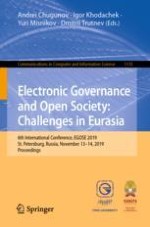2020 | OriginalPaper | Buchkapitel
Existing and Promising Theoretical Approaches to Understanding ICTs Contribution to Anti-corruption Efforts
A Literature Review
verfasst von : Cecilia Strand, Mathias Hatakka
Erschienen in: Electronic Governance and Open Society: Challenges in Eurasia
Aktivieren Sie unsere intelligente Suche, um passende Fachinhalte oder Patente zu finden.
Wählen Sie Textabschnitte aus um mit Künstlicher Intelligenz passenden Patente zu finden. powered by
Markieren Sie Textabschnitte, um KI-gestützt weitere passende Inhalte zu finden. powered by
